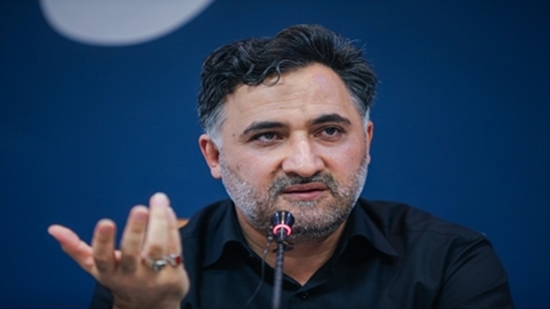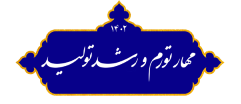Referring to the capacity of Chaharmahal and Bakhtiari to obtain a share of one percent of the GDP
Dehghani emphasized: Developing the knowledge-based economy of the less privileged areas by implementing the provincial cutting program
Vice President of Science, Technology and Knowledge-Based Economy attended the meeting of Chaharmahal and Bakhtiari Knowledge-Based Economy Council and spoke about the requirements for the development of this economy in the provinces.

According to the communication and information center in the Vice Presidency of Science, Technology and Knowledge-Based Economy, meeting of Chaharmahal and Bakhtiari province was held with the presence of Ruhollah Dehghani, the Vice President of Science, Technology and Knowledge-Based Economy, Gholam Ali Heydari, the governor, and a group of activists of Chaharmahal and Bakhtiari knowledge-based and technology companies.
Dehghani emphasized the need for the province's share of one percent of the country's gross domestic product, adding: Chaharmahal and Bakhtiari owns one hundred of the country's area; In addition, one percent of the country's population, which is the country's human capital, belongs to this province. The share of more than one hundred percent of the country's natural resources, including a 10 percent share of water resources, shows that Chaharmahal and Bakhtiari province is rich in capacities that can achieve its one percent share of the gross national product. Due to these valuable capacities, it is expected to account for at least one percent of the national gross product.
Stating that the distance between Chaharmahal and Bakhtiari province to a share of one percent of the GDP is a valuable and suitable opportunity for investment and development, he continued: Chaharmahal and Bakhtiari province is one billion dollars away from reaching the average GDP of the country, and this means that there is a good capacity and opportunity for growth. A very good opportunity that can make investment and development in this economic and valuable province.
The head of the National Elites Foundation pointed out that the balanced distribution of support and fair allocation of resources are among the most serious programs of the Vice presidency of science for the development of the knowledge-based economy, and its realization in the provinces is followed by the implementation of the national program of the provincial cut of the knowledge-based economy.
Dehghani considered the national knowledge-based economy program to be a very good opportunity for the balanced distribution of provincial resources in accordance with the steps of each province and added: In this national program, with the division of provinces, the development of the knowledge-based economy is continuously and accurately followed by the vice presidents and heads of the centers in the vice presidency of science. With continuous presence in the provinces and monitoring the state of development of the knowledge-based economy, the realization of the indicators will be followed and under this action, a healthy competition will be formed between the deputies for the promotion of the province assigned to them.
The vice president of science, technology and knowledge-based economy, stating that Chaharmahal and Bakhtiari is one of the provinces with capacity and opportunity for growth, who personally follows up the development of the knowledge-based economy in this province, continued: The reason why I myself take on the issue of knowledge-based economy in Chaharmahal and Bakhtiari province is that there are very good opportunities for growth in this province.
Emphasizing the pursuit of the three territorial advantages of Chaharmahal and Bakhtiari province under the national program of knowledge-based economy, he added: the evolution of technology chains in agriculture, creative areas of tourism and information technology, which human resources are the focus of its development, will be supported specifically in the form of Chaharmahal and Bakhtiari province's cutting program, along with mineral resources. Dehghani considered the feature of the provincial cut-off program to be serious attention to several advantageous areas of the province and special support for these advantages and added: In Chaharmahal and Bakhtiari province, these three areas are supported with special planning. The vice president of science, technology and knowledge-based economy, stating that the economy must grow in a coordinated and balanced manner in order to grow, said: Knowledge-based economy is like a tree that needs a healthy and strong trunk, stem and leaves to bear fruit, knowledge-based economy must also support and benefit small, medium and large companies, simultaneously and in a balanced manner.
He added: In the framework of the evaluation system of knowledge-based companies, these three structures, which are known as start-up, technological and innovative companies, are supported and grow according to their nature, needs and performance.
Emphasizing that the current period is the period of support appropriate to the necessity of the country and the maximum use of the existing infrastructure and capacities, the vice president of science, technology and knowledge-based economy continued: In the country, we have gone through several periods of development. In the next period, there was an increasing growth of startups, which are known as scattered green leaves and many trees. But we should know that for the economic tree to be fruitful and fruitful, the growth of leaves or the trunk is not enough alone, and the young and strong stems of knowledge-based companies should connect innovations to the body of the industry in order to witness effectiveness and fruitfulness. He added: Provincial administrators should keep in mind that the approaches of the 70s and 80s, when abundant oil revenues were spent on infrastructure development, are not effective now. We must follow a new solution, which is to design a different system in the popular economy, and bring everything we have collected from infrastructure to the field of knowledge-based economy. As long as we don't bring what we have from land, equipment, laboratory, etc. to the field of knowledge-based economy, that transformative event will not happen. This approach, which is only creating infrastructure and building the solution, will not be a solution, and we must be smart in spending money on infrastructure. In addition to the existing resources, we must use the resources resulting from the law of leapfrogging knowledge-based production and the law to support knowledge-based companies and other sources.
Dehghani continued by emphasizing that the artery of small companies should be connected to medium-sized companies and medium-sized companies should be connected to the flow of large companies. Pay attention to the leaf stem and the trunk in a balanced and intelligent way.
Emphasizing that we believe that knowledge-based economy can be brought to the people and society seriously and in the field of economy, the vice president of science, technology and knowledge-based economy continued: the field of creative industries and soft and cultural technologies is one of the examples of popularization of knowledge-based economy. We should not limit the creative economy to the economy of arts and crafts, rather, creative industries and creative economy are the knowledge-based economy in which creativity is seen more prominently than technology in creative industries.
Referring to the necessity of establishing an intangible assets evaluation system, Dehghani said: until the intangible assets evaluation system is not formed, the knowledge-based economy will not find its true position, because the knowledge-based economy is based on innovation, technology and valuable assets of this kind, and good measures have been taken in the field of establishing this system. Pointing to the creation of a headquarters consisting of provincial officials and the scientific deputy, in the framework of the provincial cutting plan for knowledge-based economy, he said: all the capacities of the province should be focused on the priorities set in the form of the provincial cutting plan, because no area other than knowledge-based economy can be the basis for exiting the recession, popularizing the economy and transforming the province.






 adress : No. 209 , between Navab Str and Roudaki Str. Azadi Str. Tehran - Iran
adress : No. 209 , between Navab Str and Roudaki Str. Azadi Str. Tehran - Iran  phone: +98 21 63478000
phone: +98 21 63478000
نظر دهید